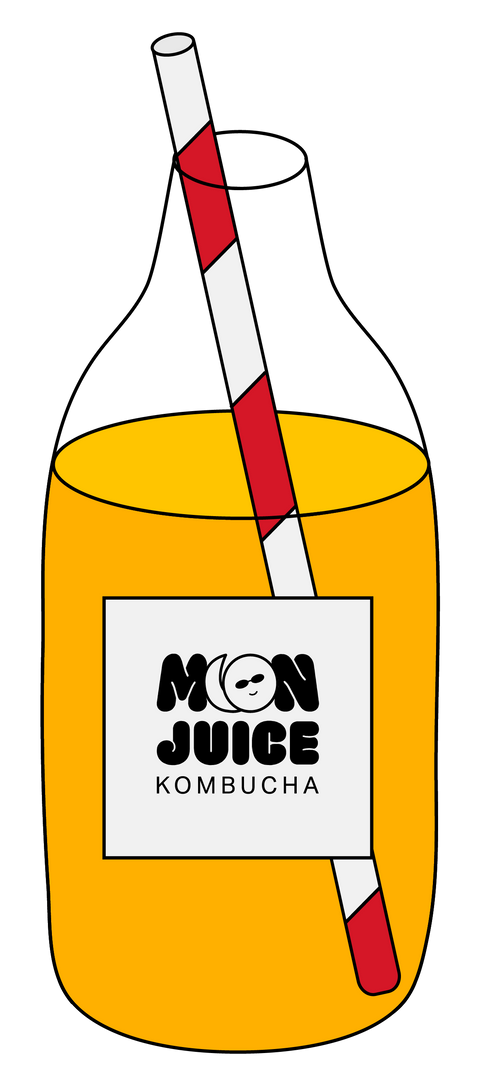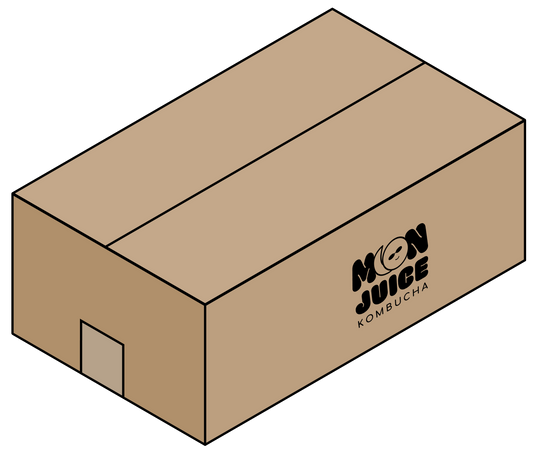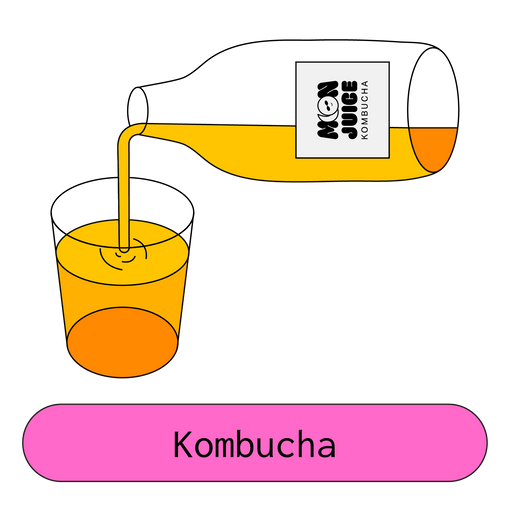KOMBUCHA FAQ


-
Kombucha is a sparkling fermented tea made from a SCOBY (Symbiotic Culture of Bacteria and Yeast).
It’s full of live probiotics and beneficial acids that support good gut health and good digestion.

-
🌞 Feel GoodLive cultures support your gut, where wellness begins: for better mood, immunity, and overall health
🌿 No Bloat
Healthy acids + enzymes in kombucha support digestion to reduce gas and bloat
💩 Detoxification
Poop better with naturally forming live probiotics that encourage regular + healthy bowel movements
Tip: if you're feeling constipated, pair drinking your kombucha with eating a fibrous fruit (🥝🍓🍌🍎🍐) at the same time. The enzymes in the fruits mix with those in kombucha and you can expect a good poop in a few hours
🫧 Glowing Skin
Antioxidants, probiotics, and detoxifying effects help reduce inflammation and promote glowing, radiant skin
⚡ More Energy
Kombucha gives a gentle boost of energy through naturally forming iron, vitamin Bs, and a small amount of caffeine
💧 Hydrate Better
Kombucha is popping in natural electrolytes and helps you get a deeper hydration
📔 Read more: -
Our kombucha is crafted for the Asian palate — deliciously refreshing, well-balanced, and naturally fizzy.
We flavour our brews with 100% natural ingredients: using fruits, herbs, roots, vegetables & flowers to create drinks that do good and taste good.
⟡˙⋆ Gut health never tasted so good ⋆˙⟡
-
If you're not sure where to start, try our crowd faves — Love Potion (raspberry rose), Earl Grey Lavender & Moonpie (passionfruit)!
-
Yes! You can enjoy our kombucha daily for gut support. Just listen to your body and adjust based on how you feel.
-
We recommend a serving size of 350ml when you're just starting out with kombucha — as you get more used to drinking it you can up the serving size!
-
Our kombucha is immediately ready to drink and does not have to be diluted!
Drink it straight from the bottle, on the rocks, use it in your favourite smoothie/mocktail/cocktail recipe — all up to your preference.
The best time to drink kombucha is during/after a meal to aid in digestion!
-
Keep refrigerated as leaving it out in the open may re-activate fermentation and cause a change in carbonation and taste.
You can leave your bottle at room temperature for up to 24 hours — it'll still be perfectly fine to chill and drink once chilled.
Please do not shake, and instead swirl the bottle gently. Your drink is naturally carbonated and you'll get a kombucha fountain if you shake it! -
Unopened kombucha stays fresh for 2–3 months in the fridge. Keeping it longer can cause the flavour to become more sour and the fizz to change due to ongoing fermentation.
Once opened, enjoy within a few days for the best taste (don't worry, the kombucha won't go bad — it'll just go flat!).
-
Most people can drink kombucha, including kids! If you're pregnant, breastfeeding, or managing a health condition, check with your doctor first.
-
As our kombucha is raw and unpasteurised, you may find SCOBY bits in your bottle.
They are living proof that your drink is alive, all-natural, and good for you!! Feel free to sift them out, or consume them as they are — they’re completely edible.
Fun fact: SCOBY bits are just like nata de coco! That's made through a similar fermentation process, but with coconut water instead.
-
No. Real kombucha needs sugar to ferment in order to produce the wonderful probiotics & acids that make it so good for you.
Most of the sugar is consumed by the live cultures during the fermentation process, leaving just a small amount behind.
Our kombucha is naturally fermented and long-aged, allowing fermentation to significantly reduce sugar levels while deepening the flavour. -
Yes, kombucha contains a small amount of caffeine as it’s brewed from a tea base.
Fermentation reduces the caffeine content to a low level that most people can enjoy without worry! Kombucha doesn’t cause jitters like coffee or regular tea might. -
Like all fermented foods, commercially brewed kombucha contains a negligible amount of alcohol as a by-product of the natural fermentation process (around 0.5% Alcohol By Volume), which is metabolised as soon as you consume it.
This is considered non-alcoholic by Food Safety standards.
-
Yes, kombucha is considered halal because it contains only trace amounts of alcohol (typically less than 0.5%) that are non-intoxicating, and result naturally from fermentation. This level of alcohol is similar to what you'd find in fermented foods like Soy Sauce, Kimchi, Tempeh!
While we are not halal-certified, all our ingredients meet halal guidelines.
📔 Read more: Is it halal to drink kombucha?
-
No! Their digestive systems are different, and even the low sugar & caffeine in kombucha may upset them.
SUBSCRIPTION FAQ


-
💳 Billing recurs monthly
🚀 Your kombucha will be delivered every 2 weeks
🛸 Minimum subscription period of 3 months
-
You may leave your flavour preferences under order notes, otherwise we will pick a mix of our favourites for you!
-
Yes! You can manage your order easily through our customer portal by logging into your account, or through the link that will be sent to your email when your subscription is confirmed.
Please note that we have a minimum subscription period of 3 months, after which you may cancel your subscription if you choose to! -
The first order is delivered within 2-5 working days. Thereafter your subsequent subscription orders will be delivered every 2 weeks!
We'll send an email notification before we deliver your order. -
🌙 10 x 350ml bottles every 2 weeks
⚡ Price per bottle: $6.50 (13% OFF!)🌙 15 x 350ml bottles every 2 weeks
⚡ Price per bottle: $5.50 (26% OFF!)🌙 20 x 350ml bottles every 2 weeks
⚡ Price per bottle: $5 (33% OFF!)
04 / Supermoon🌙 20 x 500ml bottles every 2 weeks
⚡ Price per 500ml bottle: $6 (42% OFF!)
WORKSHOP FAQ


-
Kombucha workshop
- introduction to kombucha & brewing
- 1F: hands-on kombucha making
- 2F: hands-on kombucha flavouring (with our premade first ferment)
- all about the SCOBY hotel
- brew safety tips
What you take home
- 1 jar of plain kombucha
- our house special tea blend (good quality loose leaf oolong tea + green tea)
- 2 bottles of our signature kombucha
- 2 bottles of your own flavoured kombucha made during the session
- step-by-step instructions
- jellybag
-
Our kombucha workshops are generally held on the last Saturday of every month with some exceptions. Check the exact dates here! Each workshop starts at 11am and runs until 1pm.
Held at our brewery's co-working space @ 218 Pandan Loop, S128408 (~20mins bus ride from Clementi MRT Station). Free parking is available at the venue too!
Directions & meeting location will be sent to your email 1 week before the workshop. -
It costs $150 per person! Apply the discount codes below to enjoy a special rate.
1 pax - code "KOMBUCLASS" for 10% off!
2 pax or more - code "BREWFRIENDS" for 15% off!
-
Of course! 👯♀️ Book the workshops together under 1 transaction, and use discount code "BREWFRIENDS" for 15% off each workshop!
Note: discount code "BREWFRIENDS" can only be used when there's 2 or more kombucha classes added to cart! -
Your starter kit will be given to you when you come for the kombucha workshop!
-
No! Just bring yourself 🌞
-
Yes! We keep our group sizes small so it’s relaxed, friendly, and easy to follow along. Availability is based on a first-come, first-serve basis!
DELIVERY FAQ


-
🚚 We charge a flat fee of $12 for standard islandwide shipping — but it’s free with a minimum spend of $70.
⏰ We deliver within 2–5 working days after your order is placed. You’ll receive an email confirmation when your order is on the way!
-
Don't worry! Our drinks are fine at room temperature for up to 24 hours. If you're not around, we'll leave the order at your door. Just pop the drinks in the fridge once you’re home!
-
We’re not able to guarantee specific dates right now, but you can drop us a note at checkout and we’ll try our best!
-
We’re unable to collect glass bottles back upon delivery.
You may recycle the glass bottles directly at the closest recycling center nearest to you - or repurpose them by storing your own drinks in them!
Tip: our bottles are perfect for 2F when you're making your own kombucha!
ദ്ദി(˵ •̀ ᴗ - ˵ )If you'd like us to recycle the bottles for you, you may choose to take the empty bottles to our store. Every 8 bottles (any size) = 1 free cup of kombucha. Please wash your bottles before returning them!
-
Of course! You can let us know that it's a gift & leave a short message under your order notes.
We'll write a short handwritten note (1 sentence max, our card is tiny!!) with your message and deliver it to your recipient 💌 -
We currently ship islandwide in Singapore!
-
We’re unable to offer in-store pickup for online orders as our online store and retail shop operate with separate inventories!
EVENTS & SERVICES FAQ


-
We offer a variety of wellness-focused services for events:
- Live Station Kombucha Carts where we serve kombucha on-tap
- Custom Kombucha Bottles personalised with your branding
- Hands-on Wellness Workshops where participants learn about gut health + how kombucha supports it.
We also have kombucha available for Wholesale, perfect for corporate gifting and keeping your office pantry stocked with gut-healthy goodness.
-
Pricing varies based on the package and event size. Please use the relevant forms below to submit an enquiry!
Note: You’ll be redirected to a Google Form to complete your enquiry.
-
Simply send us an enquiry through our relevant forms. We’ll guide you through the options, customise a package to fit your needs, and confirm our availability.
For more photos and details, be sure to check out the respective pages for our different services!
Note: You’ll be redirected to a Google Form to complete your enquiry.




